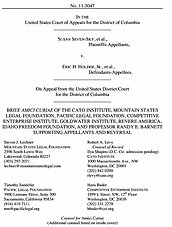Seven-Sky v. Holder
Learn more about Cato’s Amicus Briefs Program.
This is Cato’s sixth brief supporting the various legal challenges to Obamacare, this time in our own backyard, the D.C. Circuit. In February, Judge Gladys Kessler of the D.C. district court granted Congress the power to regulate “mental activity” in a decision that flippantly disregarded the core distinction between action and inaction: “Making a choice is an affirmative action, whether one decides to do something or not do something.” The frightening scope of that opinion has proven more harmful than helpful to the government, which has shifted its focus away from Kessler’s sweeping language by describing the mandate as merely a requirement that people pre-pay for the health care they will inevitably use. Our latest brief deals more directly with that added nuance — even more so than the brief Cato filed two weeks ago. Due to a local circuit rule requiring amici with similar arguments to file jointly, Cato coordinated a brief involving six other organizations — Mountain States Legal Foundation, Pacific Legal Foundation, Competitive Enterprise Institute, Goldwater Institute, Revere America, and Idaho Freedom Foundation — as well as Prof. Randy Barnett. Using Cato’s previous brief as a starting point, amici worked together to adjust our arguments in light of new ideas coming from both the government and academia. The core argument, however, remains the same: regardless of any linguistic contortions, the non-purchase of health care is fundamentally a non-economic inactivity that Congress cannot reach under the Commerce and Necessary and Proper Clauses. Allowing Congress the power to conscript citizens into economic transactions not only goes beyond current precedent, but would give Congress a general and limitless police power to do whatever it thinks best, checked only by politics. In addition to the doctrinal arguments we presented in previous briefs, here we remind the court that limiting Congress’s power is the explicit purpose of Article I of the Constitution and address the relationship of the individual mandate to United States v. Comstock, the most recent interpretation of the limits on federal power under the Necessary and Proper Clause (a case in which Cato also filed a brief and that was later covered by Ilya Somin in our Supreme Court Review and by Ilya Shapiro and Trevor Burrus in a recent law review article). Given the state of litigation around the country, we will likely not be filing another Obamacare brief before the action reaches the Supreme Court — which it’s expected to later this year, after the first few circuit courts issue their rulings.

This work is licensed under a Creative Commons Attribution-NonCommercial-ShareAlike 4.0 International License.







